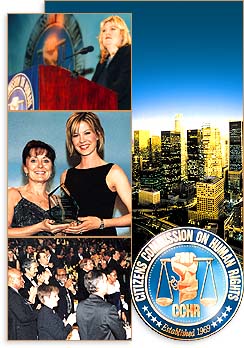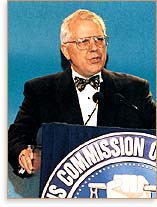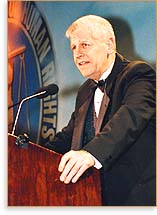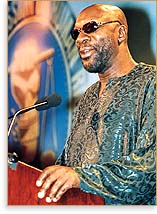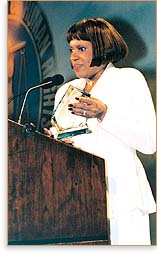
|


L.A.-based human rights
network investigates abuse
and fraud; brings reforms
to mental health industry
throughout the world.

he small, grey-haired woman walked slowly across the stage, head held high. As she took the podium, tears rolled down her face. Though she spoke no English, her emotion and pride were keenly felt, along with the words expressed through her German-English interpreter, by every one of the 700 spellbound guests in the Bonaventure Hotel ballroom in downtown Los Angeles.
Mrs. Elvira Manthey, sole survivor of Nazi Germany’s Brandenburg-Havel Psychiatric Institution since 1940, was being recognized—and not just by dignitaries and community leaders from Los Angeles and cities throughout the U.S. and 11 more nations, but by some of the top names in the Hollywood entertainment industry.
The occasion was the 31st anniversary of the Citizens Commission on Human Rights (CCHR), the Los Angeles-based watchdog organization dedicated to investigating and exposing psychiatric violations of human rights. Established by the Church of Scientology in 1969, CCHR today has 130 chapters in 30 countries throughout the world and is the leading voice on abusive methods such as the drugging of children, fraud, and the rights of psychiatric patients.
The highlight of the February 26 event was the CCHR Human Rights Awards presentations to honor those who have demonstrated extraordinary courage to protect and advance human rights in the mental health field. Elvira Manthey was one of three awardees to receive the 2000 award.
International CCHR president Jan Eastgate of Los Angeles opened the awards presentation by acknowledging those “with courage and persistence who have joined the battle against psychiatric abuse.”
“Psychiatry’s treatment of individuals has not evolved much from the whips and chains of Bedlam,” she said, citing the use of mind-altering psychiatric drugs on school children, a practice which has been condemned due to the strong link with senseless and murderous youth violence.
Expounding further on that theme, keynote speaker Rev. Heber C. Jentzsch, President of the Church of Scientology International and a founding member of CCHR, described how psychiatry first began its assault on human liberty more than a century ago.
“In 1879, Wilhelm Wundt stripped man of his spirituality, insisting that all thought was merely the result of chemical and physical processes,” said Rev. Jentzsch. “In one fell swoop, the idea of the spirit being a sentient being, separate from the body—a belief held by most of civilized man—was ‘scientifically’ dismissed. Man’s character suddenly became redefined as the product of genetics and chemistry, and his conduct falsely assigned to causes beyond his control.
“Psychiatry reduced man to the level of an animal, destroying his aspirations, perverting his hopes and stripping him of all humanity,” he concluded. “It is no less a crime than to deny a person life.”
Shadows of the Holocaust
In contrast stand those who were honored during the evening for upholding human rights, starting with Elvira Manthey. Introduced by Emmy Award-winning actress Michelle Stafford, hers was the story of more than half a century of abuse at the hands of psychiatry.
In 1938, at the age of 7, Elvira Hempel was incarcerated in Uchtspringe psychiatric institution along with her 3-year-old sister, Lisa, under Germany’s Hereditary Act. Because their father had been branded a “lazy worker,” psychiatrists concluded his children were a “public danger, congenitally feebleminded, abnormal, hereditarily diseased and ineducable.”
...........................
“Today psychiatrists and psychologists are destroying self esteem and turning schools into behavioral clinics. The solution has become the problem and violence is a consequence.”
– Patti Johnson
Colorado State School Board
...........................
|
|
Lisa was later transferred to Brandenburg-Havel and never saw her sister again. Elvira later learned Lisa was murdered in the gas chambers in August 1940. Shortly afterwards, Elvira herself was sent to Brandenburg-Havel. There, she took to cleaning the floors and furniture of the wards to maintain some shred of sanity in the midst of this terror-ridden environment. She watched as babies were left alone, screaming at night, only to all suddenly vanish by the next day. And she saw friends marched away, never to return.
In September 1940, it was her turn. She was taken into a cold, desolate room with other children, who one after another disappeared into chambers. Elvira was ordered to strip. A doctor and three nurses examined her. Then, inexplicably, she was told to return to the ward. On the list of those who were to have been killed, there was a question mark beside her name. Saved from death, Elvira could only guess the reason for the miracle was that she had demonstrated that she could work after all.
Following the war, with no education, she struggled, eventually found employment and married, becoming Elvira Manthey. But it was only after the Berlin Wall fell that she was able to return to East Germany and Brandenburg-Havel the institution, where she was able to view her medical records for the first time. She discovered she had been branded with a “genetic disability” and therefore her fictitious “mental illness” would pass on to her children and grandchildren.
A decade-long fight has subsequently ensued to obtain her files and to have the Nazi psychiatric stigma forever stricken from her medical records.
Petitions and complaints to the state and federal government and to the German Society of Psychiatrists fell repeatedly on deaf ears. “I can’t help you,” one Member of Parliament wrote. In 1992, and twice again over the next three years, her requests for her files were denied.
In 1994, with the help of her husband, she published a book on her experiences; 5,000 copies were sold in a successful effort to raise awareness of the plight of victims of the Hereditary Act. A play was written and produced about her life, and in 1996 she spoke out loudly against a plan to honor the notorious Nazi psychiatrist who instigated the child euthanasia program. The plan was shelved.
In 1998, more than 60 years after the Hereditary Act was instituted, and after a decade of campaigning by Manthey, the German government finally passed a law officially canceling all judgments of the Heritage Health Courts which had banished the “hereditarily diseased” to psychiatric and other institutions, and resulted in so many murders.
It was a major human rights achievement. But it did not apply to Manthey, who was not sent to Uchtspringe or Brandenburg-Havel by the courts but by an independent psychiatrist. And so the fraudulent psychiatric diagnosis still exists on record.
Manthey’s fight continues to this day. CCHR’s award acknowledged both her ongoing struggle and her accomplishments.
...........................
CCHR today has 130 chapters in 30 countries throughout the world and is the leading voice on abusive methods such as the drugging of children, fraud and the rights of psychiatric patients.
...........................
|
|
“I want to thank you from the bottom of my heart for this acknowledgment,” she told the crowd. “I accept this award in the name of my murdered sister, Lisa, as well as the many innocent children who were mercilessly killed by psychiatrists before and during the Holocaust.
“I want to also thank you for your interest and your sympathy for my message, and for the vital actions of the staff of CCHR. Throughout my journey to seek justice and to restore the human dignity deprived Lisa and me, I have met many honest and helpful people. You count among them.”
Fighting to Protect Children
Sixty years after the psychiatric atrocities that robbed the life of Elvira Manthey’s sister, human rights advocates are working to protect and uphold human rights for children in an entirely different setting.
Patti Johnson, a member of the Colorado State Board of Education, presented the CCHR Human Rights Award by Golden Globe Award-winning actress Jenna Elfman, has effectively fought against widespread psychiatric drugging of school children in her state.
The U.S. educational system has long been influenced by psychiatry. But the problem became even more acute in 1968 when the American Psychiatric Association added a category entitled “Behavior Disorders of Childhood and Adolescence” to its Diagnostic and Statistical Manual of Mental Disorders. These arbitrary “disorders” were unsubstantiated by scientific testing. Thus psychiatrists and psychologists usurped the integrity of the educational system by redefining academic problems as “mental disorders” and replacing workable teaching methods with invasive psychological questionnaires, behavior modification programs and mind altering drugs.
As a mother, Patti Johnson saw the halls of learning turned into mental health clinics—and she made a decision to fight back. Becoming a member of the Colorado State Board of Education in January 1995, she fought tirelessly for parents’ rights to informed consent concerning their children being subjected to invasive psychological curriculums, assessments and psychotropic drugs.
The dangers of such “treatments” hit home in April 1999, when Eric Harris and Dylan Klebold turned Columbine High School into a killing ground. Harris had been prescribed an antidepressant which is known to cause mania—including violent urges.
A Catastrophe In Education
Another public official who discovered the catastrophic effect on our society of drugging children is Pennsylvania State Representative Leanna Washington.
In July 1999, Rep. Washington held a legislative hearing into “Psychiatric Drugs and Their Effects on Children,” which was telecast live and statewide on Pennsylvania cable television. Public supporting the hearings inundated the station with calls, and the hearings were subsequently rebroadcast six times. Spurred by the reaction, Rep. Washington began to garner public support from other quarters.
Addressing the Philadelphia branch of the NAACP, she gained their unanimous vote in favor of her quest to stop the distribution of Ritalin to public school children. She also arranged to distribute information to fellow legislators across the country.
Next followed a series of roundtable discussions, first at the annual congress of the National Foundation of Women Legislators, then to the Youth Committee of the National Caucus of Black State Legislators.
Due to Rep. Washington’s spirit and determination, on December 1, 1999, the National Caucus of Black State Legislators, representing 600 legislators across the country, unanimously passed a resolution which declared that Ritalin—classified by the DEA as a Schedule II narcotic, along with cocaine and other highly addictive drugs—should never be changed to a lesser class of narcotic. It also stated that because of the “recent incidents of school violence and other occasions of violence [being] the result of children being unnecessarily medicated by such drugs,” the Caucus has called for a national investigation into the use of all psychiatric drugs and their effects on children.
Presented the CCHR Human Rights Award by soul music legend and actor Isaac Hayes, Rep. Washington told the audience, “It does not make me proud to know that the United States is the Ritalin capital of the world, that Americans consume five times as much of this drug as the rest of the world.
“We have opted to use drugs to correct what was once just normal childhood behavior, and we have chosen to use those same drugs to treat a so-called ‘disorder’ without looking at other physical causes of behavior such as diet and nutrition,” she said. “As a society, we must re-examine our practice of and our reliance on prescribing mind-altering drugs to children.”
Urgent and Vital Efforts
CCHR has worked closely for 30 years with other concerned groups, citizens and community leaders to document and inform the public of the destructive effects of psychiatry and its treatments. But whether fighting psychiatric drugging of school children or standing up against psychiatric invasions of individual rights, by evening’s end it was more than clear that CCHR’s efforts are both vital and urgent.
“Elvira Manthey is a stark reminder of the tragedy and horror that psychiatry, left unchecked, can wreak upon individual lives, families and society,” said Jan Eastgate. “Today, psychiatry is taking its toll on our very future with the current fraudulent epidemic of labeling and drugging children with nonexistent learning disorders, reinforced through the use of government laws and regulations.”
“Psychiatry still has much to answer for,” she concluded. “And CCHR is here to see to it that they are held responsible for their vicious and criminal acts which prey on all of society.”
|

|




